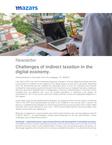
Challenges of indirect taxation in the digital economy.
Law 1819 of 2016 (tax reform) introduced significant changes in the way digital businesses that have a Colombian tax resident as the recipient of the digital good or service are to be taxed. Regarding VAT, the aforementioned law modified the generating facts of such tax indicating that services rendered from abroad are taxed with the same when the direct user or recipient has its tax residence, domicile, permanent establishment or headquarters of economic administration in Colombia. It also indicated that non-residents who carry out taxable operations in Colombia must register as responsible for VAT in the country and must comply with their formal and substantial obligations in this respect.
On the other hand, the law establishes the obligation, for taxpayers of the common regime, to withhold 100% of the VAT when paying taxable services to non-residents in the country and, in case of not doing so, it establishes the obligation for this to be practiced by the issuing entity of the credit or debit card (this will only be effective as from July 1, 2018 and provided that the service providers have failed to comply with their obligations).
While this is happening in most countries around the world, thanks to the recommendations set forth in BEPS Action 1, its implementation implies great challenges for the tax administration. These challenges can be classified as follows:
Challenge 1. Implementing tax rules without affecting the development of the digital economy.
The digital economy has been developing naturally over the last 20 years (and in the near future this will be the economy itself), so the implementation of these rules cannot discourage its dynamics, nor discourage suppliers and consumers from carrying out digital transactions, nor generate overpricing, nor disrespect the principles of e-commerce taxation defined in the Ottawa Conference of 1998 (neutrality, efficiency, certainty, simplicity, fairness and flexibility).
Challenge 2. Create a friendly environment for international business.
Since international suppliers of digital services will be liable for VAT in Colombia, when they make refunds of payments for sales cancellations, they will also have to return the VAT charged to the recipient. In this regard, there will have to be an expeditious mechanism for the Dian to also process the refund of VAT paid by such supplier, otherwise it would affect the dynamics of digital business.
Challenge 3. Ensure compliance with formal obligations by the new VAT payers.
Without physical presence in Colombia of the international supplier, it is difficult to ensure compliance with such obligations. There must be incentives for compliance with such regulations and permanent accompaniment in such process by the administration. Likewise, there must be clear and consistent regulations, faithfully translated into English, regulating issues such as online tax payments, foreign exchange issues for foreign currency transfers, correspondent banks authorized to receive payments, the obligation to open bank accounts in Colombia and to have attorneys-in-fact in the country, among others.
Challenge 4. Facilitate compliance with the obligations of subsidiary withholding agents.
Given that the administrators of credit or debit cards (subsidiary responsible parties) with which payments are made for digital operations do not have the information on the transaction being made, and given that this must be done in a matter of seconds to respect the dynamics of the digital economy, it will be a challenge for the administration to generate a system where they can identify on which payments the withholding at source must be made and on which not, as well as to know -in real time- which foreign suppliers have failed to comply with their obligations as responsible parties for VAT.
Challenge 5. Correctly characterize transactions.
Certain digital platforms do not sell goods or services, but simply perform brokerage contracts where they bring together the seller and the buyer so that between them the business is done. Here the challenge will be to determine who is responsible for the VAT; whether the platform that brings together the ends of the business or the final sellers.
Challenge 6. Prevent abuse.
This challenge will consist of being able to prevent abuse in this type of operations when they are carried out by means that are imperceptible to the control entities, such as the payment of the same with Bitcoins or cryptocurrencies, with credit cards issued by international banks, by non-traditional transactional systems, among others.
Challenge 7. Develop a Latin American integration system to encourage compliance with formal obligations and thus promote e-commerce.
In Europe, there is the so-called Moss (Mini One Stop Shop) where digital service providers register as responsible for VAT in a single member country, and there they declare and pay all their obligations in respect of the transactions they have carried out in the entire European Union, thus facilitating the conduct of e-commerce operations in the region. This could be done in the Andean Community of Nations (CAN) through a reform, addition or complement to Decision 599/2004, which harmonizes VAT treatment at the Community level.


